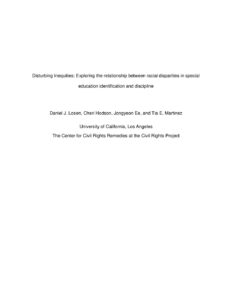Abstract
This chapter will address the excessive use of suspensions and other disciplinary actions against Black males who are disengaged from school. Academically disengaged students often come to school late, miss assignments, have difficulty understanding schoolwork, and may have attentional challenges or alternative learning styles. Black males can become disengaged from school for a variety of reasons, including being dissatisfied with school because of noninclusive curricula, racial biases, and poor relationships with teachers. In addition, some Black males are not socialized to the academic environment due to unclear and inconsistent messages about school from home and the community. Finally, some Black males have learning or attentional disabilities that are misunderstood or misdiagnosed. Research suggests that academically disengaged students account for the majority of all suspensions. This study will examine responses of students, parents and teachers who completed Monitoring the Future: A Continuing Study of American Youth. The chapter will clarify the relationship between suspensions and academic disengagement, and provide policy solutions for school leaders to develop strategies to reduce suspensions by providing a more inclusive and compassionate learning environment for Black males.
In compliance with the UC Open Access Policy, this report has been made available on eScholarship:
